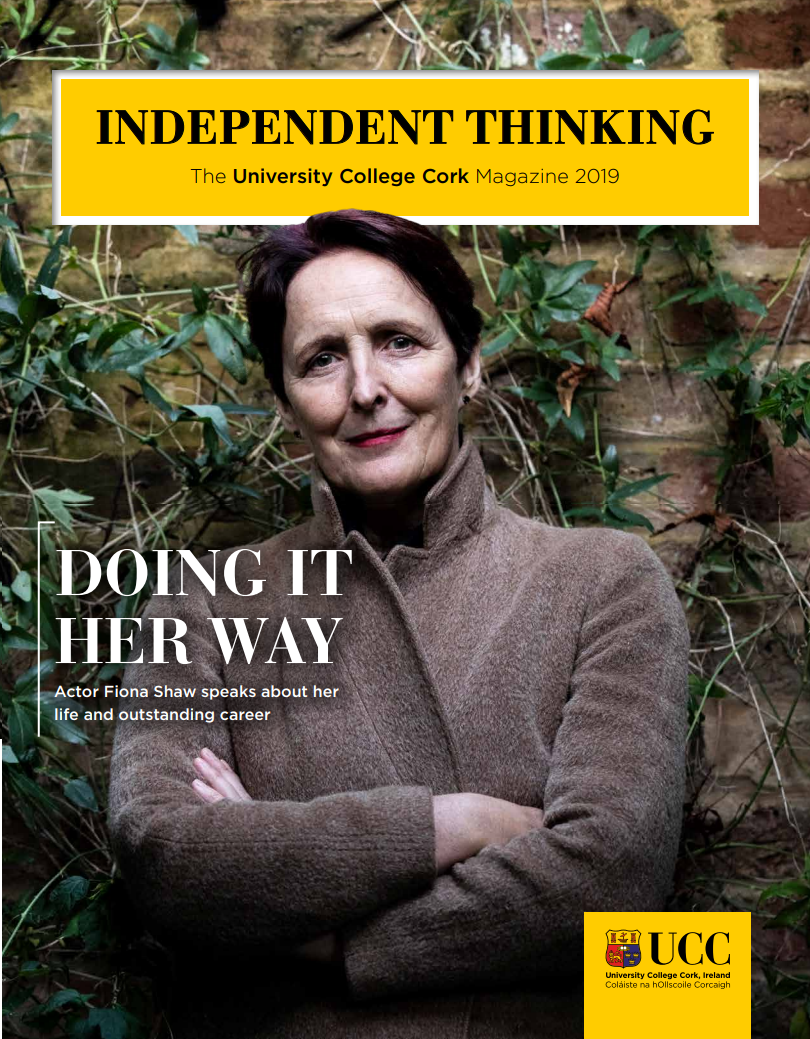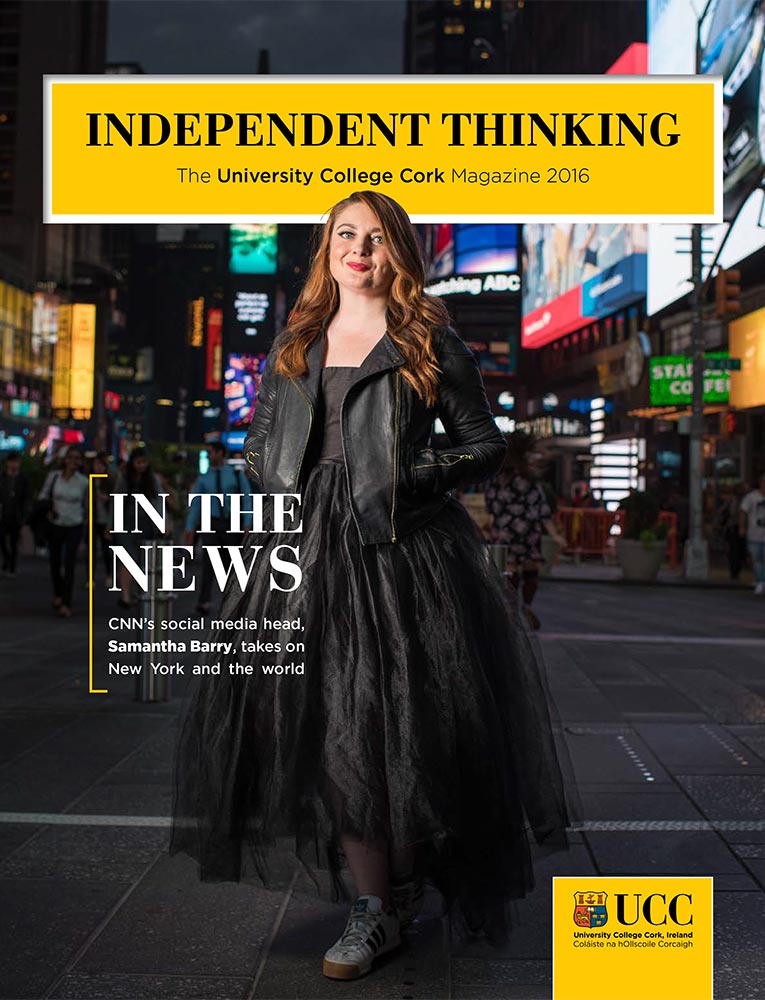Power of the People
Dr Niall Dunphy, Director of the Cleaner Production Promotion Unit at UCC, discusses the importance of ‘energy citizenship’ and how his team’s engaged research is helping to shape energy policy and practice. In conversation with Jane Haynes
.png)
From becoming the first ever third-level institution to be awarded a Green Flag, to being ranked among the top universities for its work towards creating a sustainable future, UCC is globally recognised as a leader in sustainability. The story of sustainability at UCC is the product of years of collaboration across the university community, and a melding of dedication and expertise from staff and students from many schools, units and departments.
One such unit that has been driving change through research is the Cleaner Production Promotion Unit (CPPU), led by Dr Niall Dunphy. A multidisciplinary and transdisciplinary research group based in UCC’s School of Engineering and Architecture, and in the Environmental Research Institute, CPPU conducts engaged research focused on the theme of society, sustainability and energy.
“There’s a common thread that runs through a lot of our work – we would describe it as the people’s relationship with energy: how they deal with energy; how they relate to the energy system in its entirety. It’s really looking at the societal and human aspects of energy,” explains Niall.
CPPU approaches its research through the lens of ‘energy citizenship’, which they conceptualise as how people participate in, relate to, and are recognised by the energy system. In this way, open dialogue with communities in Ireland and abroad is integral to the unit’s research, which is feeding into policy and practice development at multiple levels.
“We’re going out into people’s homes, we’re engaging with people, talking to them, trying to understand not just how they use energy but the role it takes in their life. We wouldn’t just be talking about how to reduce their energy consumption, but how to change their practices, because energy is so intertwined with everything people do,” explains Niall.
“When we get up in the morning, we would typically have a shower, and it’s the norm now to have daily or even twice-daily showers. That’s a kilowatt of our energy being used, but no one mentally thinks ‘I’m going to consume a kilowatt of energy that’s going to cost me X euro’ – they think ‘I need to have a shower’.
“That’s why it’s important to understand how people live their lives, why they use energy in the way they do … finding out what’s important to them. Then you can start talking about how you might be able to save energy, if you can save energy. That’s where we come from.”
.png)
A key focus of CPPU’s research is ‘energy poverty’. Explaining the concept, Niall says: “Recently I was relayed a story of how people operating a certain food bank were getting quite annoyed, because some of their users were turning away food and were being very picky about what they would accept. But one of the reasons was, they didn’t have the energy to cook the food, so they couldn’t take canned food for example; they had to take food that they could eat without further preparation.”
Niall references ENTRUST, a Horizon 2020 project that was a flagship project for the project. It explored how energy behaviour is shaped by not only technology but also social factors such as gender, age stage and economic privilege. The project, he says – which ran across several countries – really shone a light on energy vulnerability.
“We engaged with communities, speaking to householders – some of whom had great privilege, some of whom lived in quite deprived and upsetting situations,” Niall recalls.
The project served as somewhat of a milestone at European level, Niall explains, due to the ‘citizen jury’ research approach applied: where the unit engaged citizens and equipped them to discuss complex topics. The approach was subsequently applied and adapted in Imagining2050, an award-winning transdisciplinary research project at UCC which explored and developed future visions of, and pathways to, a low-carbon and climate resilient future.
“We have really progressed the citizen jury approach, and that approach is feeding a lot into the ongoing energy and climate dialogue,” says Niall.
Having had the opportunity to engage with people from many different communities across several countries – how do people envision the future of energy? The feedback from CPPU’s EnergyPolities SEAI project suggests that it all comes back to communities having a sense of ownership and autonomy.
“It’s been quite apparent that the greater the involvement of the communities in these projects, the more acceptance there is. There are different types of community involvement, but it has to be real and substantial. It’s far more likely for [the infrastructure] to be acceptable if it’s of and from the community,” says Niall.
"There’s not just one way of being sustainable, and so it’s important that we find a pathway to sustainability that is fair and just" - Dr Niall Dunphy
These insights are feeding into the unit’s work ongoing work including within the ENCLUDE H2020 project, which the team are working (re)conceptualising energy citizenship – what that is, and moreover what it could be.
“What this does is set the scene for options for policy makers on how people can be involved,” explains Niall.
“Most of the literature out there is focused on active participation, and the argument I would make is that citizenship is not just for those who have the agency and capacity to act; it’s also for those on the margins. It’s the people that live in rented accommodation that have draughty windows and the high tariff for energy that the landlord won’t let them change; it’s the people who live beside the nuclear powerplants; it’s the indigenous people who live in Canada whose land has been appropriated. It’s how you include everybody."
Turning to one of the latest developments at UCC, the launch of Sustainable Futures – an initiative designed to drive climate action and environmental sustainability through new education programmes – Niall emphasises the importance of education and open dialogue across the full breadth of discussions around sustainability.
“I think it’s very worthy, that we train the professionals that are going to be impacting the environment,” says Niall, referencing the success of the award-winning, university-wide sustainability module that preceded the latest initiative.
“Everybody in the university needs to be knowledgeable in and educated upon the environmental issues. Because, in every decision you’re making – whether in our personal or professional lives – there are trade-offs. Of course, there’s not just one way of being sustainable, and so it’s important that we find a pathway to sustainability that is fair and just.”
Visit the dedicated website for further information on the Cleaner Production Promotion Unit.
Photography: Provision



